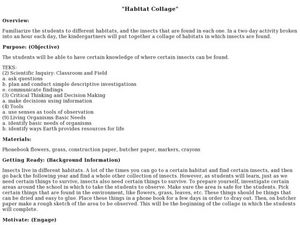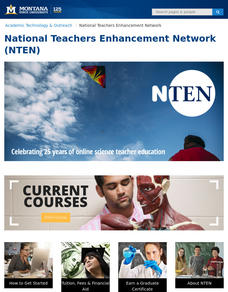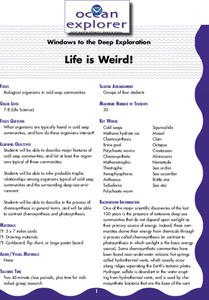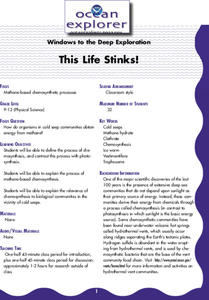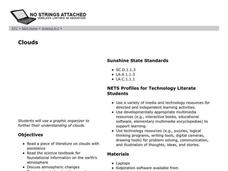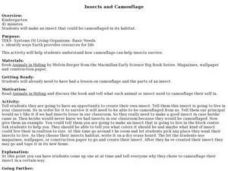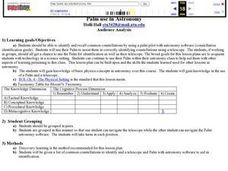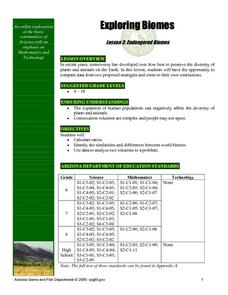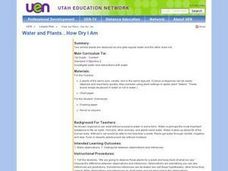Curated OER
The Water Cycle
Learners create an "animated" water cycle wheel that illustrates where water comes from and where it goes.
Curated OER
Cloud Types and Formation of Clouds
High schoolers take cloud and weather related photographs during the year, making certain to make notes of when, where and what time the photograph was taken. At some point all the pictures be gathered and a scrapbook or "cloud library"...
Curated OER
Weighing In
Third graders use a Slinky, rubber bands, paper, coins and cups to experiment with weight and its relationship to gravity. They discuss their results and develop a consensus on conclusion statements derived from their experiments.
Curated OER
Build A Model of the Water Cycle
Students identify and describe the steps in the water cycle. They discover the sun as the source of the cycle. They work together to create their own water cycle model.
Curated OER
A Leap of Space
Learners explore how smaller systems exist within larger systems as they build a collage of their place in space! Invite the students to display their posters and talk about their systems and systems of systems.
Curated OER
Welcome to Populations!
Students define what population is in their own words. In this biology lesson, students explain different ways to measure population density. They interpret population graphs.
Curated OER
Plant Growth
First graders investigate how seeds are moved and how plants grow. In this plant growth lesson, 1st graders listen to stories, play a game, and view a PowerPoint about plant growth. Students examine various seeds and recognize how they...
Curated OER
Life is Weird!
Students describe major features of cold seep communities, and list at least five organisms typical of these communities. They infer probable trophic relationships among organisms typical of cold-seep communities and the surrounding...
Curated OER
This Life Stinks!
Pupils explore the process of chemosynthesis and contrast this process with photosynthesis. They consider the relevance of chemosynthesis to biological communities in the vicinity of cold seeps.
Curated OER
How Did This Happen?
Students use websites and discussion to investigate the 2004 Asian Tsunami. Students identify the Indian Ocean coastline's physical, political and human geography features and consider how they affected loss of life and property in those...
Curated OER
Cloud Shadows
Students classify the visual opacity of various materials, what is needed to create shadows, and classify clouds by the types of shadows that they produce.
Curated OER
Become a Member of the Mission to Mars Team
Students examine the various jobs of the Mars Mission Team, organize them into categories and write a formal application for a position on the Mars Mission. Entries are made into the logbook and on-line Field Journals read.
Curated OER
You've Got to See It to Believe It!
Fifth graders examine smog and particulate matter as two major visible air pollutants. They discover how the pollutants formed and how engineers work on visible air pollution. They design an advertisement for a hybrid vehicle.
Curated OER
Clouds
Young scholars read the "Cloud Book" by Tomie de Paola and create a map of clouds identifying atmospheric conditions, color and type, and what type of weather each cloud indicates. Emphasis is placed on the use of Kidspiration.
Curated OER
Insects and Camouflage
Students create an insect that can be camouflaged in its habitat. They study how camouflage can help insects survive.
Curated OER
How Dry I Am
Students observe two similar plants as one gets regular water and one does not. They observe plants for a week and record their findings.
Curated OER
Palm use in Astronomy
Students identify and recall common constellations by using a palm pilot with astronomy software. Students will use their Palm to assist them in correctly identifying constellations using a telescope.
Curated OER
The Respiratory System
Students explore the parts of the respiratory system in this six lessons unit. The lessons presnt the concepts of the breathing, the function of oxygen in the system, how sounds are made, and the effects of pollution, smoking and disease...
Curated OER
Endangered Biomes
Learners compare data from two proposed strategies on how ot best preserve the diversity of plants and animals. They complete a worksheet and share theirviews with the rest of the class.
Curated OER
Water and Plants...How Dry I Am
First graders observe two similar plants as one gets water and the other does not. They make predictions and chart the growth of each. They draw pictures of the plants after one week.
Curated OER
A Coin Out of Water
Students examine the Michigan state quarter and identify land and water on the quarter. They locate the Great Lakes and other bodies of water on a map. They compare and contrast streams, rivers, ponds, lakes, and oceans.
Curated OER
Clues to Climate Change
Eighth graders study topics related to global weather patterns and their local effects. They hone their research and presentation skills using online resources content specific tools, and graphing data. They create simple PowerPoint...
Curated OER
Lesson 3: Understanding Population Growth
Students explain population growth in Maryland and its relationship with age structure, household growth and consumption of land.


